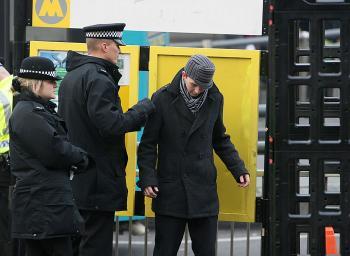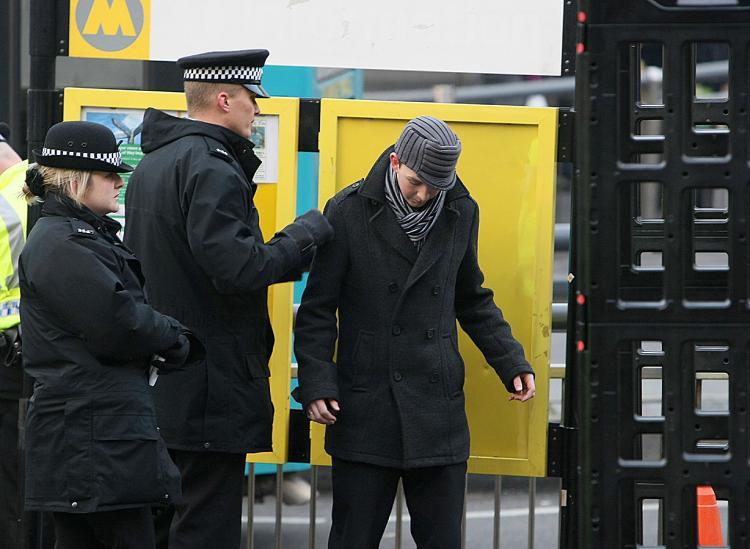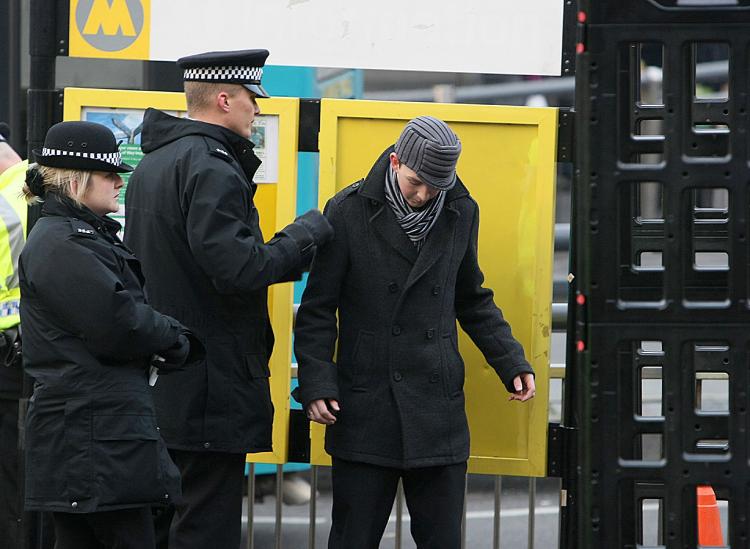The stop-and-search powers granted to U.K. police 10 years ago to tackle terrorism are illegal, according to the European Court of Human Rights.
The ruling on Tuesday follows a seven-year legal battle by two individuals who were subjected to a lengthy stop and search under the infamous Section 44 powers, and were prevented from attending a protest in London in 2003.
U.K. Home Secretary Alan Johnson indicated he would seek to appeal against the ruling in the court’s “grand chamber” of 17 judges.
The Home Office said that the Section 44 stop and search powers were an important part of the range of measures for handling the ongoing terrorist threat.
Journalist Pennie Quinton, and peace protester Kevin Gillan were stopped and searched on their way to a demonstration outside the annual Excel Centre arms fair in East London in 2003.
Police ordered Quinton to stop filming despite her press credentials.
The case was initially rejected by the House of Lords, but then taken to the court in Strasbourg, which said the police unlawfully abused the privacy rights of the plaintiffs. The court ruled that the stop and search powers granted in the 2000 Terrorism Act did not offer sufficient legal safeguards against abuses.
The government’s adviser on terrorism legislation, Lord Carlile, said that the law may require amendment as a result, but said that the judgement was complex and multilayered, and needed a period of “mature reflection,” saying he hopes it will not become a political football.
Speaking to the BBC’s World At One, he said, “I do think it’s fair to say that practice has changed a great deal since the complaint in this case was first made. For example, there is no longer an authorization for the whole of the Met and many forces are no longer applying for Section 44 authorization.”
However, Lord Carlile says he has always been critical of the way Section 44 powers have been used by police and advocated a 50 percent reduction in their use.
“In my view, Section 44 is being used far too often on a random basis without any reasoning behind its use,” he said. “The fundamental point that the court is making is that it increases the possibility of random interference with the legitimate liberties of the citizen.”
The judgement in Strasbourg also noted the disproportionate number of black and Asian people who have been stopped under the stop and search powers.
Corinna Ferguson, legal officer for Liberty acting for the plaintiffs, said in a statement that they had consistently warned of the dangers of stop and search without suspicion under the Section 44 power.
Mrs. Ferguson said, “The public, police, and Court of Human Rights all share our concerns for privacy, protest, race equality, and community solidarity that come with this sloppy law. In the coming weeks, parliamentarians must finally sort out this mess.”
The ruling on Tuesday follows a seven-year legal battle by two individuals who were subjected to a lengthy stop and search under the infamous Section 44 powers, and were prevented from attending a protest in London in 2003.
U.K. Home Secretary Alan Johnson indicated he would seek to appeal against the ruling in the court’s “grand chamber” of 17 judges.
The Home Office said that the Section 44 stop and search powers were an important part of the range of measures for handling the ongoing terrorist threat.
Journalist Pennie Quinton, and peace protester Kevin Gillan were stopped and searched on their way to a demonstration outside the annual Excel Centre arms fair in East London in 2003.
Police ordered Quinton to stop filming despite her press credentials.
The case was initially rejected by the House of Lords, but then taken to the court in Strasbourg, which said the police unlawfully abused the privacy rights of the plaintiffs. The court ruled that the stop and search powers granted in the 2000 Terrorism Act did not offer sufficient legal safeguards against abuses.
The government’s adviser on terrorism legislation, Lord Carlile, said that the law may require amendment as a result, but said that the judgement was complex and multilayered, and needed a period of “mature reflection,” saying he hopes it will not become a political football.
Speaking to the BBC’s World At One, he said, “I do think it’s fair to say that practice has changed a great deal since the complaint in this case was first made. For example, there is no longer an authorization for the whole of the Met and many forces are no longer applying for Section 44 authorization.”
However, Lord Carlile says he has always been critical of the way Section 44 powers have been used by police and advocated a 50 percent reduction in their use.
“In my view, Section 44 is being used far too often on a random basis without any reasoning behind its use,” he said. “The fundamental point that the court is making is that it increases the possibility of random interference with the legitimate liberties of the citizen.”
The judgement in Strasbourg also noted the disproportionate number of black and Asian people who have been stopped under the stop and search powers.
Corinna Ferguson, legal officer for Liberty acting for the plaintiffs, said in a statement that they had consistently warned of the dangers of stop and search without suspicion under the Section 44 power.
Mrs. Ferguson said, “The public, police, and Court of Human Rights all share our concerns for privacy, protest, race equality, and community solidarity that come with this sloppy law. In the coming weeks, parliamentarians must finally sort out this mess.”







